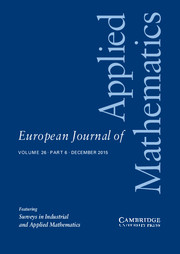Article contents
The asymptotic behaviour of Ramanujan's integral and its application to two-dimensional diffusion-like equations
Published online by Cambridge University Press: 01 February 2000
Abstract
The large-time behaviour of a large class of solutions to the two-dimensional linear diffusion equation in situations with radial symmetry is governed by the function known as Ramanujan's integral. This is also true when the diffusion coefficient is complex, which corresponds to Schrödinger's equation. We examine the asymptotic expansion of Ramanujan's integral for large values of its argument over the whole complex plane by considering the analytic continuation of Ramanujan's integral to the left half-plane. The resulting expansions are compared to accurate numerical computations of the integral. The large-time behaviour derived from Ramanujan's integral of the solution to the diffusion equation outside a cylinder is not valid far from the domain boundary. A simple method based on matched asymptotic expansions is outlined to calculate the solution at large times and distances: the resulting form of the solution combines the inverse logarithmic decay in time typical of Ramanujan's integral with spatial dependence on the usual similarity variable for the diffusion equation.
- Type
- Research Article
- Information
- Copyright
- 2000 Cambridge University Press
- 6
- Cited by


